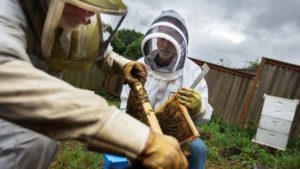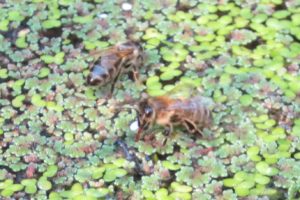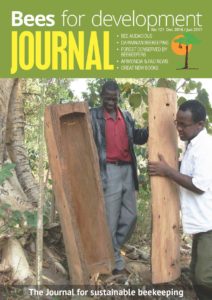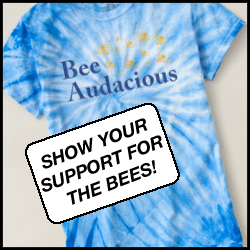Audacious Idea One: Turn Pollination Management Upside Down
Audacious Idea One
by Mark Winston
Editor’s note: What would Bee Audacious be without Audacious Ideas? Not audacious enough! Thought leaders have each submitted an audacious idea to help seed discussions at the Bee Audacious Conference. Here’s our first Audacious Idea…..
My audacious idea is to turn pollination management upside down, making wild bees the primary crop pollinator and reducing honeybees to a minor role as supplemental pollinators.
What would it take for wild bees to achieve pollination prominence, and how might beekeepers still earn an income from pollination?
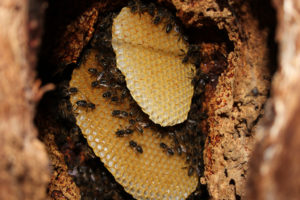
Wild bees nest in a hole in a willow tree near Steyning, West Sussex.
There has been a recent explosion of studies into using wild bees as commercial pollinators, including research around the planet on many high-value crops. While the results vary by crop, the general picture is that the 20,000 or so species of wild bees not only have excellent potential to perform the majority of crop pollination, but they are already doing so in areas where agricultural practices have not diminished their numbers.
For wild bees, it’s all about habitat. They require diverse nectar and pollen sources in and around crops to sustain their numbers when the crop isn’t blooming, and habitat in which they can nest. Proactive practices to encourage robust wild bee populations include reducing herbicide and insecticide use and planting hedgerows and floral strips in which bees can nest and forage.
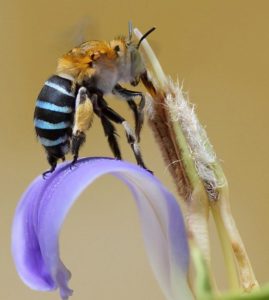
Long-tongued bees and long-tubed flowers coevolved, like this Amegilla cingulata (Apidae) on Acanthus ilicifolius.
Beekeepers might shift to become habitat managers, earning income by designing and implementing management zones and practices that foster and sustain wild bee populations. Honeybees would be a part of this system, but diminished from current model in which colonies are moved long distances, often a number of times a year and possibly to their detriment.
Government could assist through subsidies targeted to shift agriculture into pollinator-friendly directions. Hundreds of billions of dollars are spent globally each year supporting industrial agriculture, and if even ten per cent of those funds were moved into ecologically based farming, we would see a significant improvement in wild bee diversity and abundance. By reducing pressure on honeybees we would also see significant improvements in honeybee health.
Get your tickets – help the bees.

 Previous Post
Previous Post